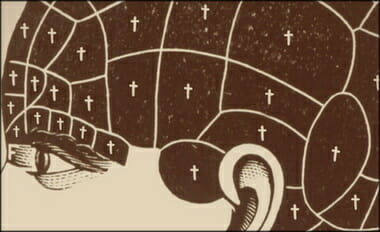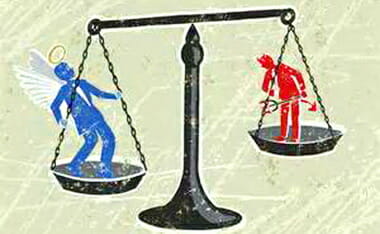I had a wonderful conversation with a very nice fellow at Starbucks (I will simply refer to him at times as John D.). The encounter started because of the book I was reading and an unsolicited question about it. It was only AFTER the conversation that I noted why question about the book was asked. The book was “Undeniable: How Biology Confirms Our Intuition That Life Is Designed.” (Watch the author speak about the book HERE.) After the conversation had concluded, I realized what drew John D. into engaging me. During the conversation, as you will see, he intimated that he was a lawyer. Hence, the large title that drew him in is “Undeniable.”
Light conversation took place about the book, mainly because I am just beginning the book and do not know the content well enough yet to discuss it specifically. I did steer the conversation towards DNA just a tad — with Stephen Meyer’s book in mind.
For the reader of this post, keep in mind that while I did not go in-depth into the discussion of DNA that immediately follows, I did reference briefly the aspects of information being separate from the means of transmission [matter]:
Evolutionary biologist George Williams observed: “Evolutionary biologists have failed to realize that they work with two more or less incommensurable domains: that of information and that of matter…. The gene is a package of information, not an object. The pattern of base pairs in a DNA molecule specifies the gene. But the DNA molecule is the medium, it’s not the message…. These two domains will never be brought together in any kind of the sense usually implied by the term ‘reductionism. Information doesn’t have mass or charge or length in millimeters. Likewise, matter doesn’t have bytes…. This dearth of shared descriptors makes matter and information two separate domains of existence, which have to be discussed separately, in their own terms.”[1]
As the information theorist Hubert Yockey observes, the “genetic code is constructed to confront and solve the problems of communication and recording by the same principles found . . . in modern communication and computer codes.” Yockey notes that “the technology of information theory and coding theory has been in place in biology for at least 3.85 billion years,” or from the time that life first originated on earth. What should we make of this fact? How did the information in life first arise?[2]
Codes are not matter and they’re not energy. Codes don’t come from matter, nor do they come from energy. Codes are information, and information is in a category by itself.[3]
A great example is a newspaper.[4] If you read an article on a topic that is information being passed on to you by another intelligence. The modern roadblock for today’s naturalist is the problem of looking at the molecules that make up the ink printed page stores information via the 26 letters of the alphabet as somehow related to the origin of the information being passed on. The problem is that the newspaper is merely the mediu, for the information. Like a Compact Disc is for music. The CD is merely the medium to carry the information. The
The next question is, how much information can the DNA molecule hold?
a) A pinhead made of DNA: Let us imagine we had enough DNA to fill the volume of a pinhead with a diameter of 2 mm. How many paperbacks (each with 189 pages as in [G19]) could be represented by the information held in that amount of DNA? Answer: about 25 trillion. That would be a pile of these paperback books approximately 920 times the distance from the earth to the moon (384,000 km). In 2011, if we were to equally distribute these paperbacks amongst the approximately 6.93 billion people on Earth, every person would receive about 3,600 copies. b) Drawing a wire: Now let us stretch the material of the 2 mm diameter pinhead into a wire of the same thickness as the DNA molecule (2 x 10-6 mm). How long would this wire be? Unbelievably, it would stretch 33 times around the equator, which has a circumference of 24,860 miles (40,000 km). c) One thousandth of a gram of DNA: If we were to take a milligram (1 mg = 10-3 g) of a (double helix) strand of DNA material, it would almost stretch from the earth to the moon![5] (Click to enlarge) Dr. George Church, a pioneering molecular geneticist at Harvard/MIT, informed us in a Sciencexpress article in August of 2012, that the digital-information storage capacity of DNA is “very dense.” How dense? One gram of DNA can store 455 exabytes of information. For those readers like myself whose eyes glaze over as soon as computer nerds start talking about bytes and RAM’s I will put it in simple layman’s terms. One gram of DNA – the weight of two Tylenol – can store the same amount of digitally encoded information as a hundred billion DVD’s. Yes, you read correctly, I said a hundred billion DVD’s. Every single piece of information that exists on the Earth today; from every single library, from every single data base, from every single computer, could be stored in one beaker of DNA. This is the same DNA/Genetic Information/Self-Replication System that exists in humans and in bacteria (which are the simplest living organisms that exist today and have ever been known to exist). In short, our DNA-based genetic code, the universal system for all life on our planet, is the most efficient and sophisticated digital information storage, retrieval, and translation system known to man.[6] I will repeat a line from the above graphic description: Let me give you another example of the same sort of reasoning. Imagine that you have just finished reading a fabulous novel. Wanting to read another book like it, you exclaim to a friend, “Wow! That was quite a book. I wonder where I can get a bottle of that ink?” Of course not! You wouldn’t give the ink and paper credit for writing the book. You’d praise the author, and look for another book by the same writer. By some twist of logic, though, many who read the fabulous DNA script want to give credit to the “ink (DNA base code) and paper (proteins)” for composing the code. In a novel, the ink and paper are merely the means the author uses to express his or her thoughts. In the genetic code, the DNA bases and proteins are merely the means God uses to express His thoughts.[7] Human DNA is like a computer program but far, far more advanced than any software ever created.[8] Information is information, neither matter nor energy. No materialism that fails to take account of this can survive the present day. – Norbert Weiner, MIT Mathematician and Father of Cybernetics[9] [1] This is a fuller quote adapted from two sources: Donald E. Johnson, Probability’s Nature and Nature’s Probability : A Call to Scientific Integrity (Charleston, SC: Booksurge Publishing, 2009), 44; Stephen C. Meyer, Signature in the Cell: DNA and the Evidence for Intelligent Design (New York, NY: Harper One, 2009), 17. [2] Meyer, ibid. [3] Perry Marshall, Evolution 2.0: Breaking the Deadlock Between Darwin and Design (Dallas, TX: Benbella Books, 2016), 187. [4] The graphic to the right of the footnote is from, Werner Gitt, In the Beginning Was Information (Bielefeld, Germany: Christliche Literatur-Verbreitung, 1997), 86. [5] Werner Gitt, Without Excuse (Atlanta, GA: Creation Book Publishers, 2011), 288 (graph from p. 286). [6] Moshe Averick, Atheistic Science is Rapidly Sinking in the Quicksand, algemeiner. [7] Gary Parker, 1.3 The Origin of Life: DNA and Protein, AiG. [8] Bill Gates, The Road Ahead (New York, NY: Penguin Group, 1995), 188. [9] Stan Lennard, So Easy a Caveman Could Do It?, RtB.
…Continuing
After relaying the basics of information and DNA, I then went through what I have memorized quite well — here are the bullet points:
- Albert Einstein developed his general theory of relativity in 1915;
- Around the same time evidence of an expanding universe was being presented to the American Astronomical Society by Vesto Slipher;
- In the 1920s using Einstein’s theory, a Russian mathematician (Alexander Friedman) and the Belgium astronomer (George Lemaitre) predicted the universe was expanding;
- In 1929, Hubble discovered evidence confirming earlier work on the Red-Light shift showing that galaxies are moving away from us;
- In the 1940’s, George Gamow predicted a particular temperature to the universe if the Big Bang happened;
- In 1965, two scientists (Arno Penzias and Robert Woodrow Wilson) discovered the universe’s background radiation — and it was only about 3.7 degrees above absolute zero.
(see more)
I mentioned that this information from science supports the Hebrew Scripture’s account of creation ex nihilo [from nothing], whereas, all the other writings from the Egyptians, Sumerian, Greeks, as well as all the major religious texts all posit an eternal universe or matter in some form or another. I relayed this quote roughly, noting Dr. Wilson’s participation in the Big-Bang becoming a widely accepted:
- “Certainly there was something that set it all off. Certainly, if you are religious, I can’t think of a better theory of the origin of the universe to match with Genesis.” ~ Robert Wilson: is an American astronomer, 1978 Nobel laureate in physics, who with Arno Allan Penzias discovered in 1964 the cosmic microwave background radiation.
John D. then steered the conversation towards other matters, giving me some biographical information about himself. He mentioned he was a lawyer. I gave him my card to my site and explained that if you hover over “Home” with your mouse (at the top of my site), to click on “Recommended Reads.” I pulled this page up on my phone and mentioned these top four books are by lawyers or people specialized in evidence… the parameters of which courts use as acceptable. I pointed to the Simon Greenleaf book, and started to explain his background to him…
 |
 |
 |
 |
… I noted that Simon Greenleaf wrote what was a first in American history, giving our court system a 3-volume set on what “is” evidence, thus, divorcing us from the British concepts of what courts should and should not accept as evidence. His work, “A Treatise on the Law of Evidence. 3 Vols.,” is considered a classic of American jurisprudence and is still used in law-schools today as part of the history of law. I included a bit more biographical info before getting to the main part of the point. I mentioned Dr. Greenleaf was an atheist (really I should have said agnostic) as well as a Jew who was skeptical of the Resurrection of Jesus. Continuing I said that Simon Greenleaf took his knowledge of what makes good evidence to respond to a challenge by a student in regards to applying the rules of evidence to the Gospels to prove-or-disprove the Resurrection. After about two-years, Dr. Greenleaf became a Christian and wrote his book, “Testimony of the Evangelists.“
Simon Greenleaf died October 6, 1853. Born of Jewish descent on December 5, 1783, Greenleaf was an agnostic, some say atheist, who believed the resurrection of Jesus Christ was either a hoax or a myth. No stranger to truth, and to the proof of the truth, Greenleaf was a principal founder of the Harvard Law School and a world-renowned expert on evidence. Challenged by one of his students one day to “consider the evidence” for the Resurrection of Jesus Christ, Greenleaf set out to disprove it, but ended up concluding that the Resurrection of Jesus Christ was indeed fact, not fiction. Being a man of conviction and reason, and in accordance with his conclusions, Greenleaf converted from Agnosticism to Christianity. His life and works went on to inspire such scholars as John Warwick Montgomery, Josh McDowell, Ross Clifford and Lee Strobel…. (Biographical Info)
It was when I finished that part of our discussion that he mentioned he was Jewish. “Awesome, I am glad I focused in on Simon Greenleaf then,” I thought to myself. John D. then segued by stating that as a lawyer he would never introduce such hearsay/shabby evidence as what the Old Testament affords people, mentioning specifically the old testament not pre-dating the Dead Sea Scrolls in any written form (they date around 200 B.C. or younger. I did not bring up an earlier example (by 400-years) of a partial scroll of Numbers, instead, I wanted to bring into his court room he was apparently running something along the same lines. Or this recent tech advance allowing the reading of a 2,000 year-old scroll:
This comes by way of END TIME blog:
…Modern Technology Unlocks Secrets of a Damaged Biblical Scroll
Nearly half a century ago, archaeologists found a charred ancient scroll in the ark of a synagogue on the western shore of the Dead Sea. The lump of carbonized parchment could not be opened or read. Its curators did nothing but conserve it, hoping that new technology might one day emerge to make the scroll legible. Just such a technology has now been perfected by computer scientists at the University of Kentucky. Working with biblical scholars in Jerusalem, they have used a computer to unfurl a digital image of the scroll.
So neat! What does the text say?
It turns out to hold a fragment identical to the Masoretic text of the Hebrew Bible and, at nearly 2,000 years old, is the earliest instance of the text. … The scroll’s content, the first two chapters of the Book of Leviticus, has consonants — early Hebrew texts didn’t specify vowels — that are identical to those of the Masoretic text, the authoritative version of the Hebrew Bible and the one often used as the basis for translations of the Old Testament in Protestant Bibles.
So the authoritative 1000 year old Masoretic text is identical to this 2000 year old text found and examined by computer? Those tenth century monks who precisely copied and instituted rules for further copying so as to ensure perfection of the texts is proved 100% reliable by computer forensics in this millennial age? Even more neat!
“We have never found something as striking as this,” Dr. Tov said. “This is the earliest evidence of the exact form of the medieval text,” he said, referring to the Masoretic text.
It is striking, that a 2000 year old text from Leviticus is exact as to the Masoretic texts copied in 1000 AD! So thrilling…
I mentioned that in the Dead Sea Scrolls was an intact copy of Isaiah. At the time the oldest manuscript the Church had was dated at A.D. 980. When the Dead Sea Scrolls were found we had a copy dated to 125 B.C. — that is just about 1,100 years apart. Only one single word was added to the text that was likewise previously confirmed by the LXX.
The word “light”
He will see it[a] out of His anguish,
and He will be satisfied with His knowledge.
My righteous Servant will justify many,
and He will carry their iniquities.
Footnotes: [a] Isaiah 53:11 DSS [Dead Sea Scrolls],
LXX [Septuagint] read see light
Here we see the ending paragraphs giving an overview of the issue in the excellent book by Dr.’s Geisler and Nix:
With the discovery of the Dead Sea Scrolls, scholars have Hebrew manuscripts one thousand years earlier than the great Masoretic Text manuscripts, enabling them to check on the fidelity of the Hebrew text. The result of comparative studies reveals that there is a word-for-word identity in more than 95 percent of the cases, and the 5 percent variation consists mostly of slips of the pen and spelling. To be specific, the Isaiah scroll (1Q Isa) from Qumran led the Revised Standard Version translators to make only thirteen changes from the Masoretic Text; eight of those were known from ancient versions, and few of them were significant. More specifically, of the 166 Hebrew words in Isaiah 53 only seventeen Hebrew letters in 1Q Isb differ from the Masoretic Text. Ten letters are a matter of spelling, four are stylistic changes, and the other three compose the word for “light” (add in v. 11), which does not affect the meaning greatly. Furthermore that word is also found in that verse in the LXX and 1Q Isa.
CONCLUSION
The [many] thousands of Hebrew manuscripts, with their confirmation by the LXX and the Samaritan Pentateuch, and the numerous other crosschecks from outside and inside the text provide overwhelming support for the reliability of the Old Testament text. Hence, it is appropriate to conclude with Sir Frederic Kenyon’s statement, “The Christian can take the whole Bible in his hand and say without fear or hesitation that he holds in it the true word of God, handed down without essential loss from generation to generation throughout the centuries.”
Norman Geisler and William Nix, A General Interdiction to the Bible (Chicago, IL: Moody, 1986), 382.
I mentioned that in our case the court would not worry about the amount of years between the two documents, rather they would show precedence that very little has changed between the two. So In a court all that would matter to the jury is how these texts are transmitted and if this transmission is done well/accurately. John D. even mentioned the telephone game where one kid whispers into another kids ear… and by the end of circle you are left with something different. I would note as politely as possible that that analogy is a non-sequitur, and leave it at that.
(By the way, introducing Detective Wallace’s work always allows me to give my testimony. While I was one of the early inmates to super-max here in my town, he connected with that in that before it officially opened, he got to tour the facility.)
The odd thing is — at least to me — is that he made a comment about hearsay testimony after I mentioned J. Warner Wallace’s BOOK and discussed some of his biographical background. John D. mentioned that to bring into to court a person that hadn’t had a police officer immediately (or very close to the event) write down the witness’ description of events that the testimony would be thrown out.
I was shocked.
So I brought up a hypothetical crime done in a neighborhood where people typically keep silent, whether out of fear, culture, whatever. Lets say it was a murder. Some months later [even years] some witnesses start coming forward… four of them, and described the events. Each a little different because of recollection, vantage point, their demeanor, and the like. But the witnesses describe something that fit well with the forensic evidence. I was politely blunt with John when I said of course you could easily get a conviction of this murderer. He agreed, mentioning circumstantial evidence. Which is really what we are talking about.
My friends started showing up for the Bible study I was early for… but John had to tell me a story about Jewish tradition and children. “Seders” was the topic and children were the true scribes of tradition. Which is partially true… that is how the Jewish tradition and culture has lasted for all this time – memorization and habit. I even write that Christians should take their Gospel studies as seriously. He discussed how innocent children are not knowing how to even lie to about 4-years old. I did not interrupt him, even though the Bible (see “A”) and studies of children (see “B”) show this not to be the case, I wanted him to say what he needed to say.
Before I said my final statements… as he wanted to get his coffee and go (we had talked almost half-an-hour). I simply reiterated his statement to me near the beginning of the conversation that he had yet to see evidence that he would make him consider or take the Bible seriously (a rough recap of his statement). I got him to admit that he hasn’t gone out of his way to do so, and that if I got him a single book — if he would take it as a gift and consider reading it when he has the time.
To which he agreed.
I then concluded with my final thoughts to close us out. I mainly went over the conversation in bullet point form; mentioning of the evidences we discussed (scientific evidences as well as manuscript evidences) which I added go a long way to build a case for the Bible and the Judeo-Christian faith. I then pointed him back to what he wanted. That is, he shared a colloquial story from his family (which is fine), but his lovely “story” about the innocence of children and their faithful transmission of tradition was no part of what a court would accept.
At that he went his way. John is a regular and I look forward to future discussions with him if he wishes. But more than that, even though I am using a pseudo name for him PLEASE PRAY that the Holy Spirit quicken his heart to His truths. As he reads the book I got him pray that he follows some of the references/resources to further look into the claims of this Jesus.
I hope as well me adding to the conversation and linking out to other resources is a help for your future conversations.
…The total depravity of man is seen throughout the Bible. Man’s heart is “deceitful and desperately wicked” (Jeremiah 17:9). The Bible also teaches us that man is born dead in transgression and sin (Psalm 51:5, Psalm 58:3, Ephesians 2:1-5). The Bible teaches that because unregenerate man is “dead in transgressions” (Ephesians 2:5), he is held captive by a love for sin (John 3:19; John 8:34) so that he will not seek God (Romans 3:10-11) because he loves the darkness (John 3:19) and does not understand the things of God (1 Corinthians 2:14). Therefore, men suppress the truth of God in unrighteousness (Romans 1:18) and continue to willfully live in sin. Because they are totally depraved, this sinful lifestyle seems right to men (Proverbs 14:12) so they reject the gospel of Christ as foolishness (1 Corinthians 1:18) and their mind is “hostile toward God; for it does not subject itself to the law of God, for it is unable to do so” (Romans 8:7).
The Apostle Paul summarizes the total depravity of man in Romans 3:9-18. He begins this passage by saying that “both Jews and Greeks are all under sin.” Simply put, this means that man is under the control of sin or is controlled by his sin nature (his natural tendency to sin)…
Whether lying about raiding the biscuit tin or denying they broke a toy, all children try to mislead their parents at some time. Yet it now appears that babies learn to deceive from a far younger age than anyone previously suspected.
Behavioural experts have found that infants begin to lie from as young as six months. Simple fibs help to train them for more complex deceptions in later life.
Until now, psychologists had thought the developing brains were not capable of the difficult art of lying until four years old.
Following studies of more than 50 children and interviews with parents, Dr Vasudevi Reddy, of the University of Portsmouth’s psychology department, says she has identified seven categories of deception used between six months and three-years-old.
Infants quickly learnt that using tactics such as fake crying and pretend laughing could win them attention. By eight months, more difficult deceptions became apparent, such as concealing forbidden activities or trying to distract parents’ attention.
By the age of two, toddlers could use far more devious techniques, such as bluffing when threatened with a punishment.
Dr Reddy said: “Fake crying is one of the earliest forms of deception to emerge, and infants use it to get attention even though nothing is wrong. You can tell, as they will then pause while they wait to hear if their mother is responding, before crying again.
“It demonstrates they’re clearly able to distinguish that what they are doing will have an effect. This is essentially all adults do when they tell lies, except in adults it becomes more morally loaded.”…
UPDATE — LEVITICUS









